The Bloody Sun of Russia: what kind of person was the Holy Baptist Prince Vladimir
Categories: Culture | Europe | History | Nations | World
By Pictolic https://pictolic.com/article/the-bloody-sun-of-russia-what-kind-of-person-was-the-holy-baptist-prince-vladimir.htmlThe grandson of Rurik and the son of Igor, Prince Svyatoslav, was a true pagan who preferred the battlefield to the Kiev prince's terem. Malusha, a slave of his mother, Princess Olga, gave birth to one of the ruler's sons. The boy was named Vladimir, and he was destined to change the history of Russia. The church ranked him among the saints, and the people called him the Red Sun, but in life Vladimir was a sinner who killed his brother, raped girls and had a huge harem.
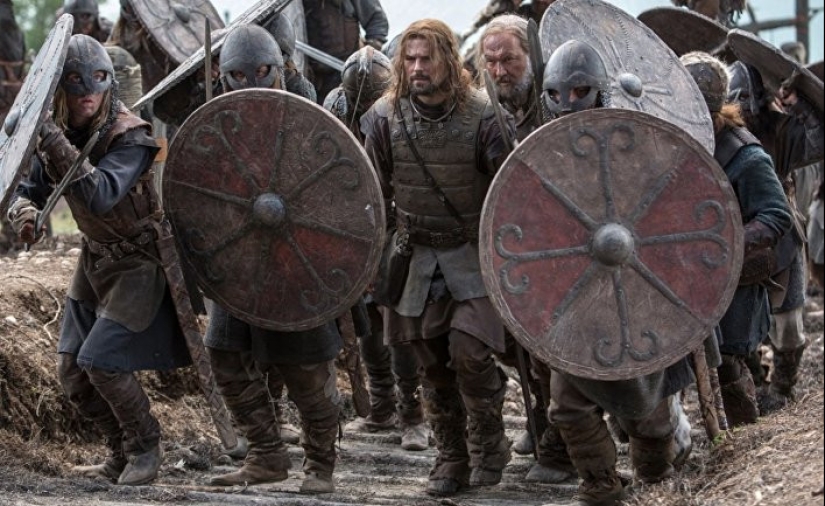
Pregnant by Svyatoslav, Malusha was sent to the village of Budutino, where she gave birth to a boy. The mother of the future baptist of Russia was a slave, but not a simple one. The housekeeper is an important person in the house. She is responsible for the owner's property, which means that she enjoys his trust. Another detail is the name of the princely bastard. Malusha called her son by the two-part name Vladimir, that is, "who owns the world". Such names in Russia were worn only by the nobility.
Prince Svyatoslav during a military campaign
The boy was brought up by his mother until the age of three, then Princess Olga took the grandson. Most likely, the grandmother did not lose contact with the former housekeeper and favored Vladimir. After all, Prince Svyatoslav is a true pagan, who has many mistresses, and therefore side children. However, it is Vladimir who receives a noble name and becomes one of the heirs, although he is not a legitimate son.
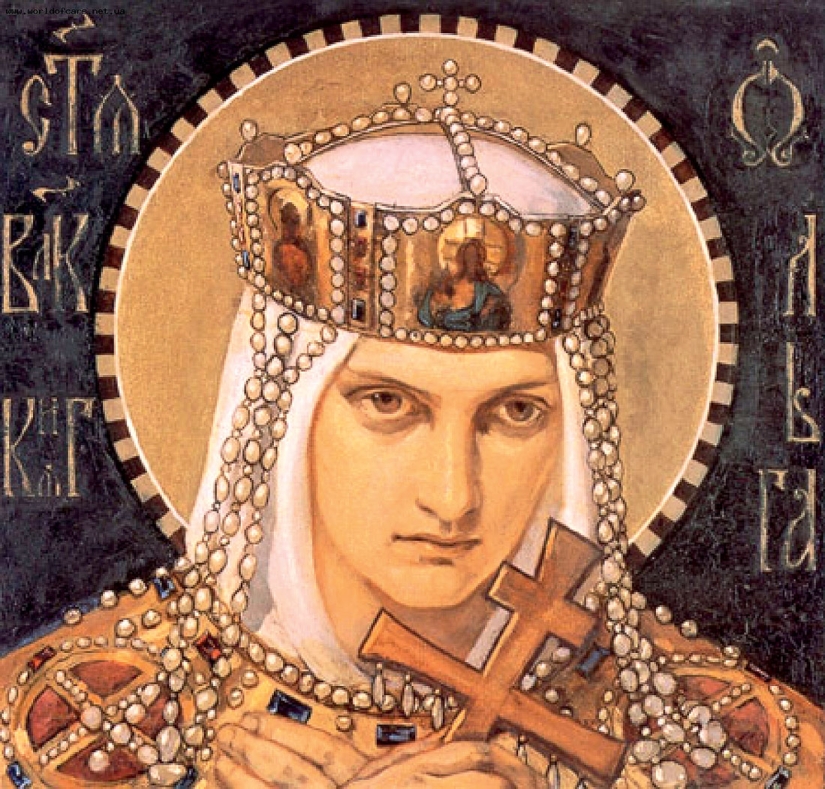 Princess Olga — the first Christian ruler of Russia
Princess Olga — the first Christian ruler of Russia
The slave origin greatly influenced Vladimir's life, forming complexes in him that will still manifest themselves in the future. With his craving for power and cruelty, he tried to compensate for his "lack" and erase the memory of his origin.
The name of Vladimir first appears in 969. A year before that, Prince Svyatoslav returns from Bulgaria to Kiev, but is going on a new campaign. Ambassadors come to him from Novgorod, who ask to give them one of their sons to reign. The legitimate heirs-Yaropolk and Oleg-do not want to go to the far northern region. Svyatoslav sends his younger son Vladimir to the Novgorodians, whose elder brother Malusha Dobrynya becomes his guardian.
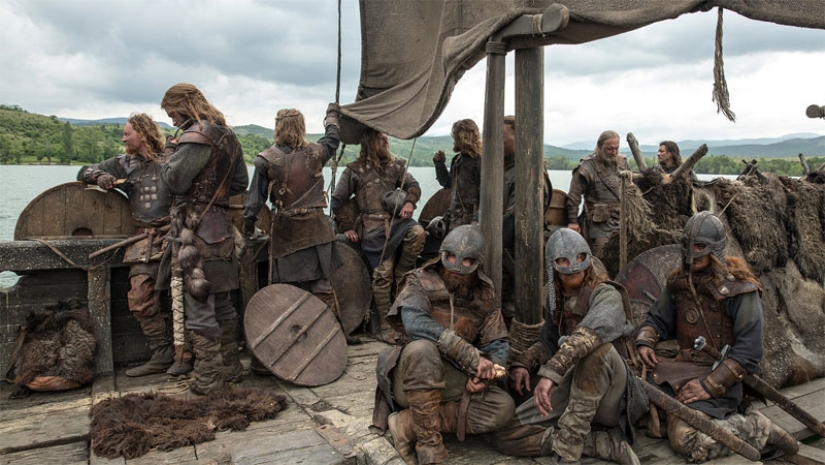
Novgorod is the central point of the trade route "from the Varangians to the Greeks" and Vladimir was a symbol of Kiev's presence in this strategically important region. Here he ordered to build a huge temple to Perun, the patron of the prince's squad. The makings of a reformer were already visible in Vladimir at that time.
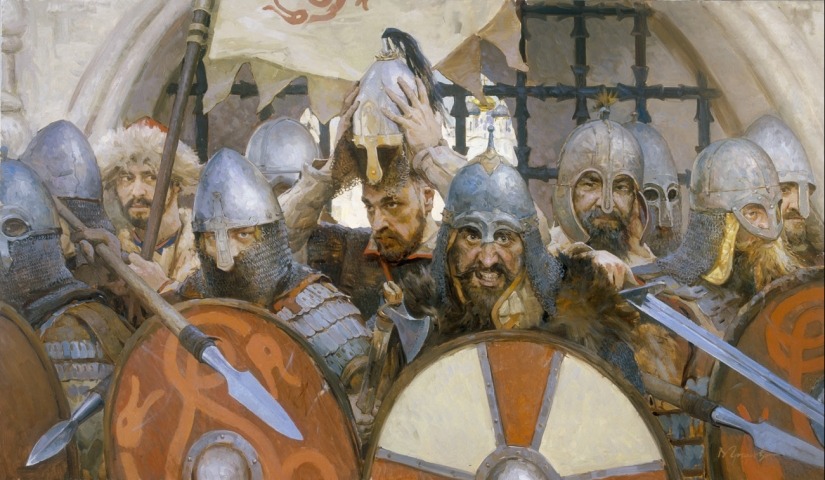 Varangian squad
Varangian squad
Novgorod was inhabited by Slavs, Finns, Scandinavians, with whom the young prince had a particularly friendly relationship. Among the Varangian nobility, Vladimir becomes his own and new friends will soon prove their loyalty with swords.
In 972, the Pechenegs killed Prince Svyatoslav on The Dnieper rapids. The Kiev throne was occupied by Yaropolk — the eldest son of the deceased ruler. The average Oleg gets the land of Drevlyans, and Vladimir remains in Novgorod, far from politics. In 975, between Yaropolk and Oleg breaks out in a war, in which the older brother won, and the middle one dies in battle.
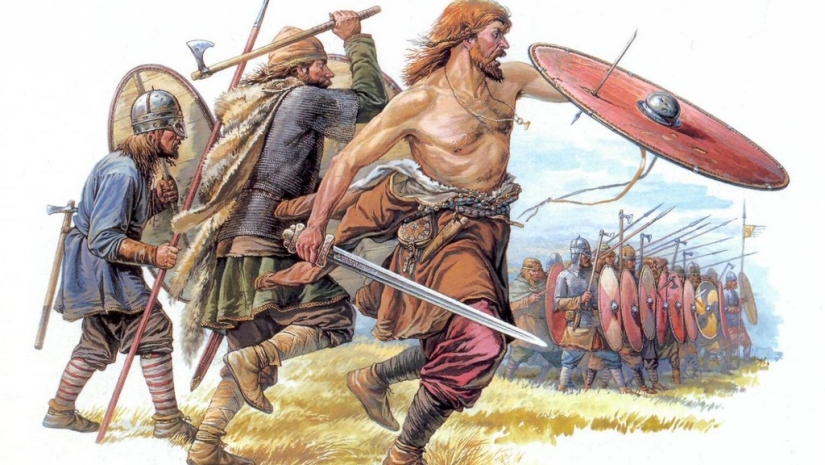 Slavic warriors
Slavic warriors
Vladimir receives news of the war in a distorted form, he decides not to contact his older brother and runs away to Scandinavia, and Yaropolk captures Novgorod and personally rules the entire Rurik empire. In the north, the fugitive gathers an army of Varangians and returns to Russia. Having regained Novgorod, he sends a message to his brother:
Vladimir's army, recruited from the Varangians, Novgorodians,Krivichi and Chudis, moved to Kiev and approached the city of Polotsk, where Prince Rogvolod reigned. Vladimir offered Rogneda-the daughter of Rogvolod-to become his wife, but she replied that it was not fitting for her, a noble girl, to marry the son of a slave. Vladimir did not forgive such insults.
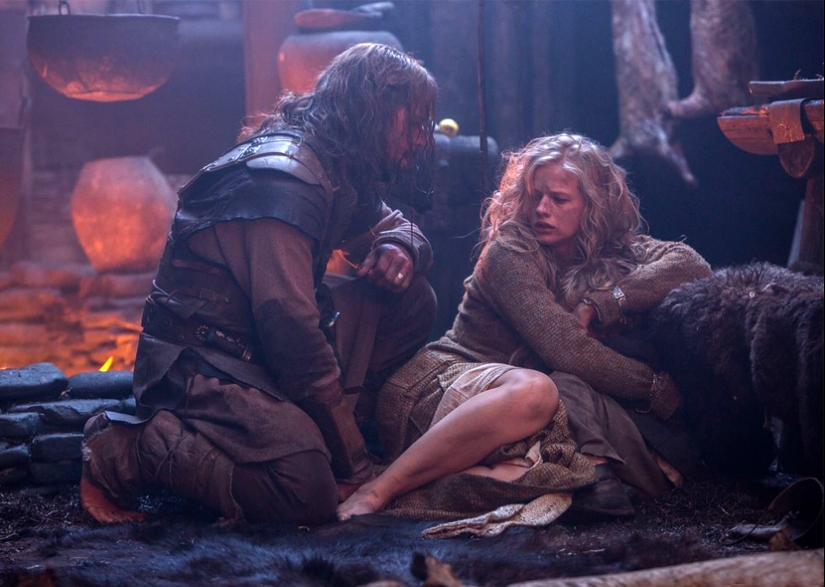
The prince takes Polotsk by storm. On the advice of Uncle Dobrynya, Vladimir rapes Rogneda in front of her brothers and father. After that, the future saint kills all the relatives of the offender and takes her to his wife. They carried the hatred for each other through their entire lives.
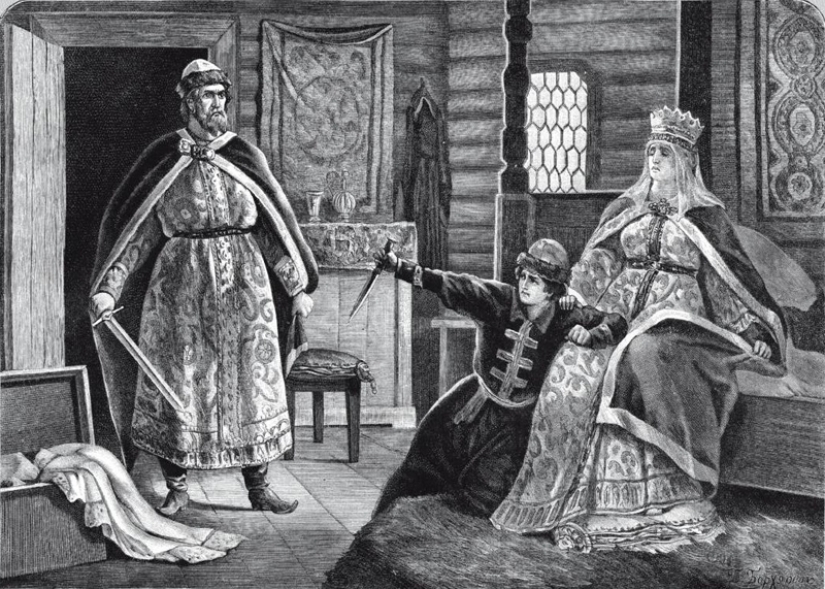 The young Izyaslav protects his mother from Vladimir
The young Izyaslav protects his mother from Vladimir
When Vladimir became the prince of Kiev, Rogneda tried to stab him in his sleep, but at the last moment he managed to deflect the blow. The prince ordered his wife to put on the most beautiful clothes and prepare for death. When Vladimir came to personally kill Rogneda, their common young son Izyaslav came to her defense. The boy, with a sword in his hand, stood in the way of his father and said that he would not allow the murder of his mother. Vladimir was angry at first, but later respected his son and gave him Polotsk, once taken from his grandfather, to the board.
Yaropolk, feeling his weakness, settled in Kiev. Vladimir did not storm the city, but bribed the chief voivode of his brother, the boyar Fornication. The traitor persuaded Yaropolk to take refuge in the fortress of Rodin, where an ambush was waiting for him. The prince of Kiev was captured and brought to Vladimir. However, the brothers did not see each other. When Yaropolk was walking along the terem, to negotiate with Vladimir, two Varangians came around the corner, who raised him "under his bosom" with swords.
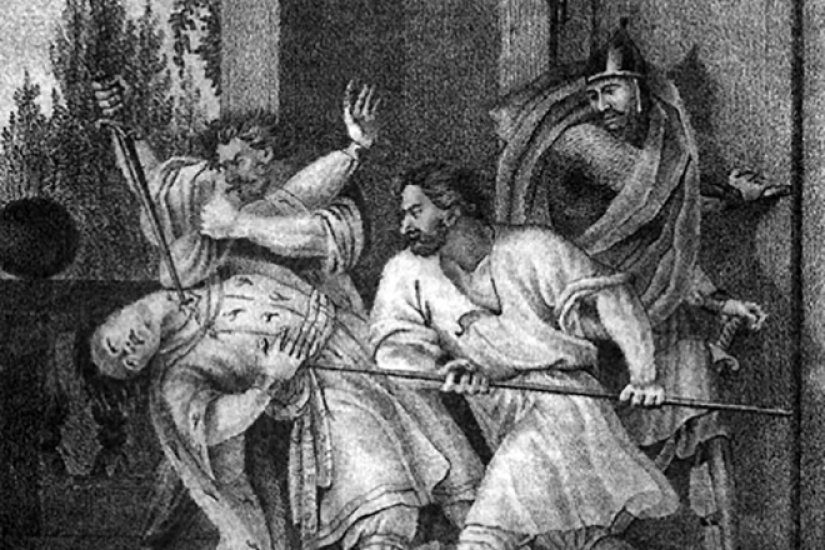
The murder of Yaropolk. At the time of the attempt, the boyar Fornication locked the doors so that the prince's supporters would not prevent the massacre
Vladimir was not worried about the treacherous murder of his brother. This is evidenced by the fact that he made his pregnant wife his concubine. The girl gave birth to a son, Yaropolk, whom she named Svyatopolk. Without their prince, the Kiev squad quickly switched to the side of the winner.
The Varangians of Vladimir fought for the right to plunder occupied villages and cities. He did not give Kiev to plunder, but poisoned the mercenaries in Constantinople. One of the first actions of the new ruler was the distribution of his concubines to the princely residences: 300 in Vyshgorod, 300 to Belgorod, 200 to the village of Berestovo. The number of slaves is known from the chronicle of Nestor, how many girls there really were remains a mystery.
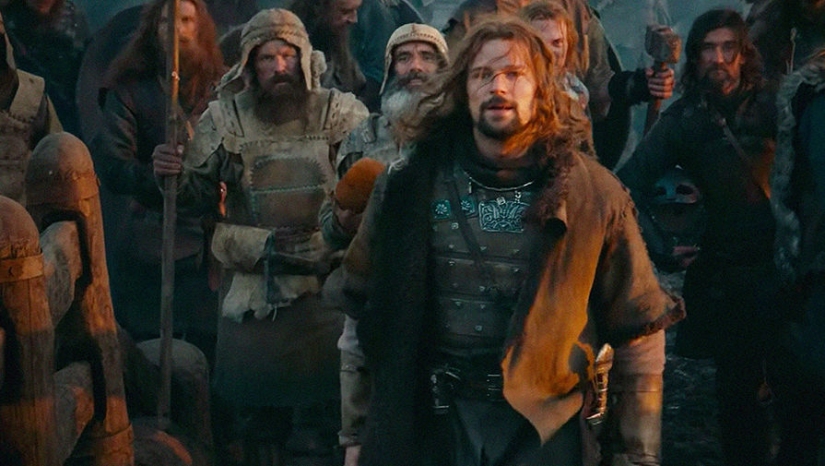
In the XI century, chroniclers wrote that Vladimir was insatiable in fornication and molested both young girls and married women. The prince was also remembered for his feasts, mentions of which have been preserved in epics. In them, the prince always feasts with the squad and gives orders to the heroes, sitting at the table. However, fornication and partying did not prevent him from building a strong state.
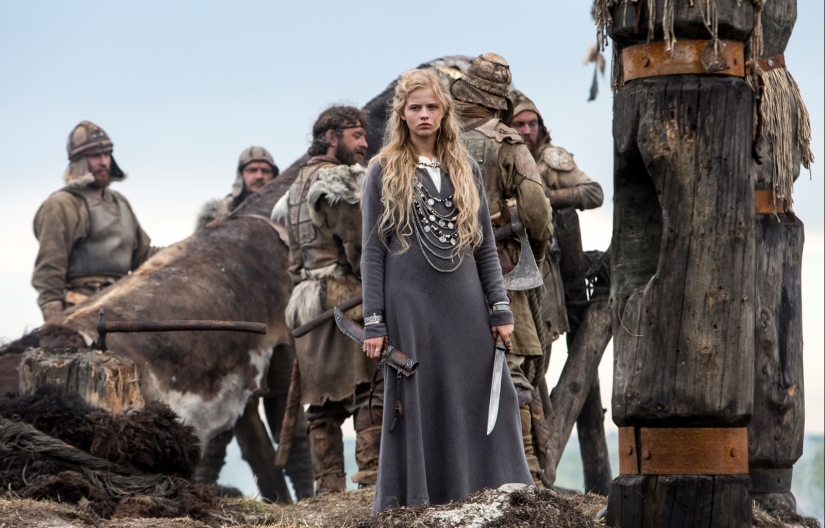 During the first 10 years of his reign, Vladimir expanded the borders of Russia, defeated its external and internal enemies, and also formed the state administration apparatus. New cities and fortresses were built, colonization of the lands bordering the Wild Field was organized. Vladimir was a real pagan, both in private life and in the management of the state — unrestrained, aggressive, desperate.
During the first 10 years of his reign, Vladimir expanded the borders of Russia, defeated its external and internal enemies, and also formed the state administration apparatus. New cities and fortresses were built, colonization of the lands bordering the Wild Field was organized. Vladimir was a real pagan, both in private life and in the management of the state — unrestrained, aggressive, desperate.
Yaropolk favored Christians, and Vladimir led the opposite policy. He ordered the destruction of churches, synagogues and mosques, and in their place to build pagan temples to a new pantheon of gods: Perun, Horsu, Dazhbog, Stribog, Simarglu and Mokoshi.
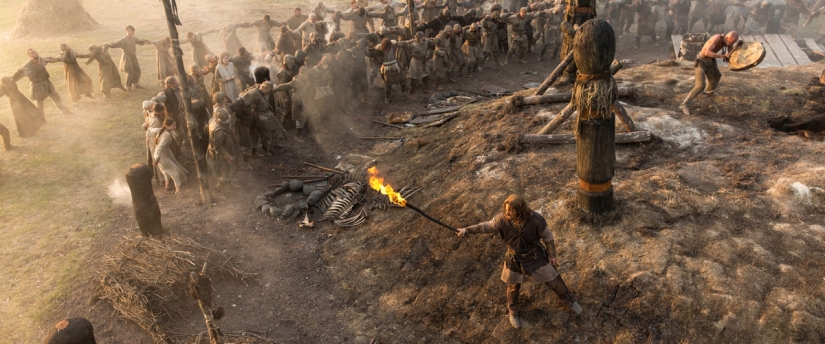
The prince associated himself and his squad with the militant Perun. However, numerous gods were not suitable for a single power. We need a formula of one ruler on earth and one in heaven. Vladimir's choice fell on the Christianity of the Byzantine rite.
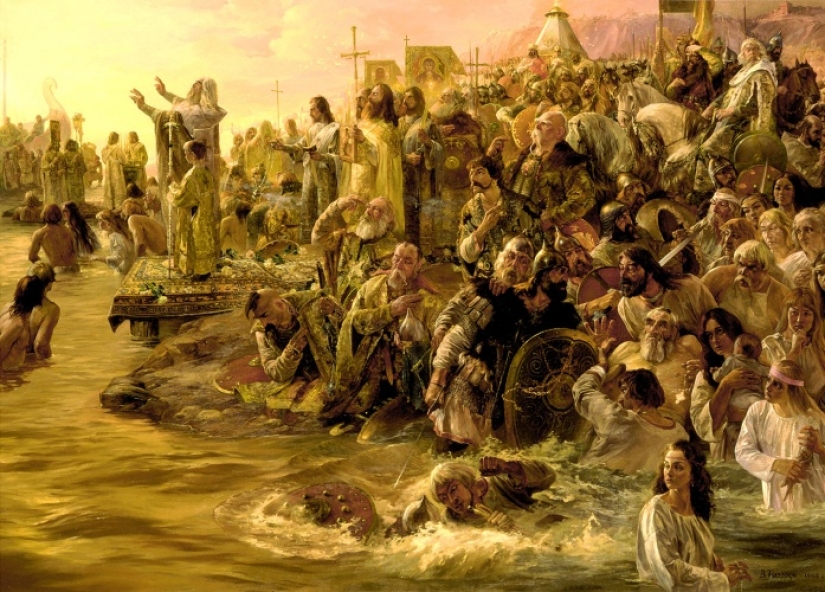
Epiphany of the Kievans
The rite of baptism in 988 was conducted by the Greek priest Paul. Before that, Vladimir made a military campaign to the Byzantine Empire and beat out the emperor's sister, Princess Anna, as his wife. Although the Romans did not want to be related to the wild Scythian. To confirm the seriousness of his intentions to marry and believe in Christ, Vladimir seized the city of Korsun in the Crimea and organized a massacre in it. Such weighty arguments convinced the emperor to take the Kiev prince as a son-in-law.
The new faith met the resistance of the tribal nobility and the common people. The most ardent opponents of Christ were the Novgorodians, who once sheltered and supported the son of a slave, and now the Grand Duke. In gratitude, Vladimir sent Uncle Dobrynya and Voivode Putyat to Novgorod.
Destruction of pagan idols
Putyata managed to break into the center of Novgorod, but his squad was surrounded. Then Dobrynya set fire to the city. While the Novgorodians were saving their homes, Vladimir's uncle rescued the soldiers. Hence the saying came from: "Putyata baptized with a sword, and Dobrynya with fire." The victors severely defeated the city, after which the alien god Romeyev became a little closer to the Novgorodians. However, anti-Christian uprisings in Northwestern Russia broke out for another 150 years.
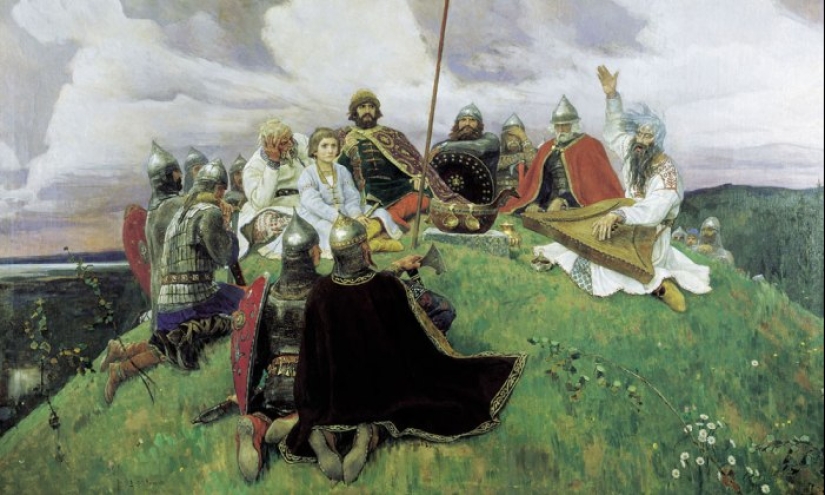
On July 15, 1015, Vladimir died, and 11 of his legitimate sons staged a massacre for power. Since the XIV century, Vladimir has been recognized as an equal-to-the-Apostles saint. In the epic epic, the murderer of his brother, a polygamist and a rapist entered as Prince Vladimir the Red Sun.
Keywords: Vikings | Vladimir | Prince | Epiphany | Russia | The Middle Ages
Post News ArticleRecent articles

It's high time to admit that this whole hipster idea has gone too far. The concept has become so popular that even restaurants have ...

There is a perception that people only use 10% of their brain potential. But the heroes of our review, apparently, found a way to ...
Related articles

The name of Boris Skosyrev is not very familiar in our country, but in Europe this man was remembered very well. This energetic and ...

It is difficult to dispute the fact that the Viking Age left a serious mark on the history of mankind. Without the Scandinavian ...

There is a museum in the north of Norway, which is not boring, but really interesting. The main object of the Lofotr museum complex ...

New Year's is a time to surprise and delight loved ones not only with gifts but also with a unique presentation of the holiday ...